01.11.2025 by Viktor Siebert
Repair of a Yaskawa SGMGH-03A5A-SE11 AC Servo Motor
The insulation resistance measured by the customer was only about 100 kΩ instead of the required multi-megohm range
Diagnosis and Fault Cause
Our initial inspection confirmed poor insulation. The motor interior was soaked with coolant due to worn seals, leading to internal leakage and corrosion. The residual moisture created leakage currents between windings and housing, causing the SGDK drive to trigger overload and overcurrent alarms.
The encoder UTSAH-B17BE showed contamination but no electrical damage. Its glass disk and board were slightly soiled with emulsified residue, which affected optical reflection quality. Fortunately, full restoration was possible.
Repair Process
The motor was completely disassembled, thoroughly cleaned, and dried. All seals and O-rings were replaced. The stator was dried in a controlled oven until insulation exceeded 400MΩ.
Winding integrity was verified, bearings replaced, and the shaft polished. The encoder was disassembled, cleaned, recalibrated, and rebuilt at component level. Final testing was performed with an SGDK-050505AEA-V drive, achieving nominal torque and stable feedback response.
Quality Assurance and Testing
Post-repair measurements confirmed:
- Insulation resistance > 400 MΩ
- Stable torque output
- Normal idle current
- No residual moisture or leakage
The unit passed a 30-minute load test without anomalies. The encoder feedback was stable, and no further alarms occurred.
Preventive Maintenance and Customer Recommendations
This type of insulation issue is common in machine tools using water-based emulsions. Regular visual checks of seals and motor ventilation are essential. We recommend annual insulation resistance testing and immediate drying if emulsions are detected. Continuing operation under such conditions may cause irreversible winding damage.
Result
After the complete overhaul, the SGMGH-03A5A-SE11 runs flawlessly again. The regulation response and torque curve are as good as new. The customer was able to reinstall the motor without changing drive parameters.
Once again, this case demonstrates that even heavily moisture-damaged servo motors can be saved when properly repaired with professional procedures and preventive measures.
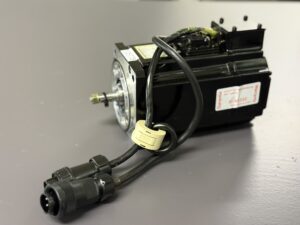
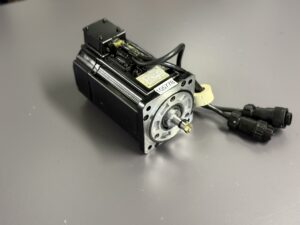
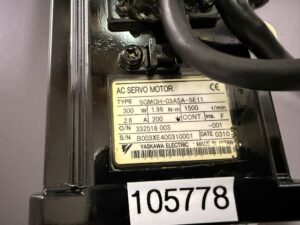
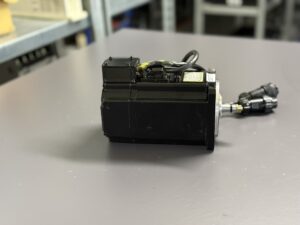
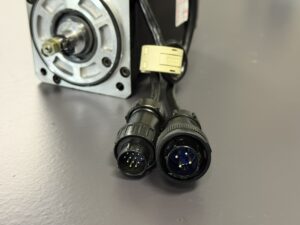
Information about the mentioned Servopack and Servomotor:
More information about our Yaskawa repairs can be found here.
📞 Feel free to contact us if you have any questions regarding your Yaskawa drive technology. Our experienced team is always ready to assist you.
Technical Specifications
Technical Data
Designation: Yaskawa AC Servo Motor
Model: SGMGH-03A5A-SE11
Rated power: 0.3 kW
Rated current: 2.6 A
Rated voltage: 200 V AC
Rated torque: 1.96 Nm
Rated speed: 1500 rpm
Insulation class: F
Encoder: UTSAH-B17BE (absolute encoder)
Protection class: IP65
Country of origin: Japan
Associated Servopack: Yaskawa SGDK-050505AEA-V
Application and Characteristics
The motor originates from a Star automatic lathe, where Yaskawa drives operate in combination with Siemens control systems. These machines are designed for high precision and often work in humid environments with cutting and cooling emulsions. Proper sealing and insulation are therefore essential for long-term reliability.
Function Description
The SGMGH-03A5A-SE11 belongs to the SGMGH series of compact servo motors with an integrated absolute encoder. It provides precise torque control at low speed and is used in machine axes that require fast and accurate positioning. The UTSAH-B17BE encoder supplies high-resolution position feedback to the SGDK Servopack, ensuring smooth control and minimal deviation.
Alarm Messages and Possible Causes
Based on the Yaskawa servo alarm reference (Servo Alarme-4.pdf), several possible fault patterns corresponded with the alarms reported by the customer: overcurrent, overload, and ground fault
| Alarm code | Description | Possible cause |
|---|
| 0x10 | Overcurrent (short circuit) | Moisture in motor, poor insulation |
| 0x11 | Ground fault | Leaking seals, fluid ingress |
| 0x51 | Overspeed (motor) | Encoder feedback error |
| 0x63 | Error with pulse count per rotation | Contaminated encoder signals |
| 0x79 | Motor overheat | Leakage current due to fluid residue |
| 0x71 | Overload (momentary) | Low insulation, high leakage current |
| 0x74 | Inrush current overload | Moisture in stator or winding |